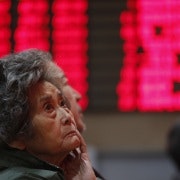Turning around a Chinese slowdown
Perceptions have certainly changed a lot in the last few months. As recently as three years ago there were so few analysts who were sceptical about the sustainability of Chinese growth that we rarely disagreed among ourselves. Now, however, the group of sceptics has become large enough that there are serious disagreements among us as to what will happen next.
One source of disagreement is about whether Beijing can turn around the current growth slowdown. Some argue that business confidence is so low that it will be all but impossible to get growth up during the rest of this year. They point to the falling demand for loans as proof that Beijing cannot simply force up credit by relaxing loan constraints in the banking system.
Weak loan demand certainly does seem to be a problem. Bloomberg had the following story earlier this month:
"China's biggest banks may fall short of loan targets for the first time in at least seven years as an economic slowdown crimps demand for credit, three bank officials with knowledge of the matter said.
"A decline in lending in April and May means it's likely the banks' total new loans for 2012 will be about 7 trillion yuan ($1.1 trillion), less than an estimated government goal of 8 trillion yuan to 8.5 trillion yuan, said one of the officials, declining to be identified because the person isn't authorised to speak publicly. Banks are relying on small and mid-sized companies for loan growth after demand from the biggest state- owned borrowers dropped, the people said.
"The drying up of loan demand attests to the severity of China's slowdown and may add pressure on Premier Wen Jiabao to cut interest rates and expand stimulus measures."
Times have certainly changed. It used to be that the incredibly low interest rates set by the central bank all but guaranteed infinite demand for credit. After all if you are paying almost nothing for capital (perhaps even a negative real rate), and your risks are guaranteed, it almost always makes sense to borrow and invest in anything that offers even the most meagre or evanescent of returns.
In those days Beijing could pretty much set the pace of growth simply by capping the maximum level of loan growth permitted to the banks (actually not so simple because for the past decade Chinese banks have expended all their ingenuity in figuring out how to cheat the loan caps). Borrowers had infinite demand and banks would lend right up to (and sometimes even over) the cap because their profits were guaranteed and their risks socialised.
Where will demand come from?
Now, it seems, the expected returns to investment are so low that even cheap capital and socialised credit risk is not enough to tempt privileged borrowers into borrowing and investing. This fact alone should worry those of us who are still not yet convinced that China has a serious investment problem. Over at The Economist there is a long section on the Chinese economy in the current issue, which is well worth reading because it puts the bull case very intelligently, but it does so in part by making a distinction between "over-investment” and "mal-investment” which I think is irrelevant.
The problem is the sustainability of debt and the cost of servicing it relative to the economic wealth generated by investment, and this occurs whether China over-invests or mal-invests. At any rate, those who are very sceptical about China's ability to regain growth this year certainly have a strong case.
Nonetheless I am not so sure I agree with them. I suspect that Beijing has a few arrows left in its quiver. I think that current loan demand may indeed be low, but if Beijing were simply to force local governments (or allow them, since they anyway love to invest bank money wantonly) to engage in another round of infrastructure investment, bad as that may be for China's eventual rebalancing, I think it would cause another spurt of growth in the short term. On that subject, here is an article from Monday's South China Morning Post:
"Premier Wen Jiabao said yesterday the country would step up efforts to maintain stable economic growth, in a statement that many read as a signal for imminent monetary easing. During a fact-finding trip to Wuhan, in Hubei province, over the weekend, Wen said macroeconomic controls should be "improved and fine-tuned” in line with the latest economic situation and problems, if any, Xinhua reported.
"The central government should 'properly handle' the relationship between maintaining growth, reforming economic structures and managing consumer price inflation, he said. 'We should continue to implement a proactive fiscal policy and a prudent monetary policy,' Wen said. 'More priority should be given to maintaining stable economic growth'.
"Many economists said Wen's remarks showed policymakers were worried about the economic slowdown, which has already spilled into the second quarter from the first."
Certainly this, and lots of other similar signalling by Beijing, suggests, that the slowdown in growth has become so serious that it may break through the political gridlock typical of the period before a leadership transition. In my opinion, then, the rather alarming slowdown in Chinese growth is likely to be reversed in the next quarter and we will get GP growth close to either side of 8 per cent. I hope it is lower rather than higher, because the more debt China creates to generate growth, the more difficult the ultimate adjustment. But this is politically a very important year and I don't think anyone wants it to end with a whimper.
Michael Pettis is a Senior Associate at the Carnegie Endowment for International Peace and a finance professor at Peking University's Guanghua School of Management. He blogs at China Financial Markets.
















